Key Takeaways:
- Focus on eating enough protein (60-80 grams daily) to support muscle growth after surgery.
- Start with light resistance training and gradually increase the intensity.
- Combine proper nutrition, regular exercise, and necessary supplements for the best results.
After bariatric surgery, building muscle might seem challenging, but with the right approach, it’s definitely possible. In fact, focusing on muscle growth is one of the best things you can do for long-term success.
This article explains how to build muscle after bariatric surgery using doctor-approved strategies to help you regain strength and enhance your overall health, including insights into life after bariatric surgery and how to resume exercise after bariatric surgery effectively.
Table of Contents
Understanding Post-Bariatric Surgery Muscle Loss
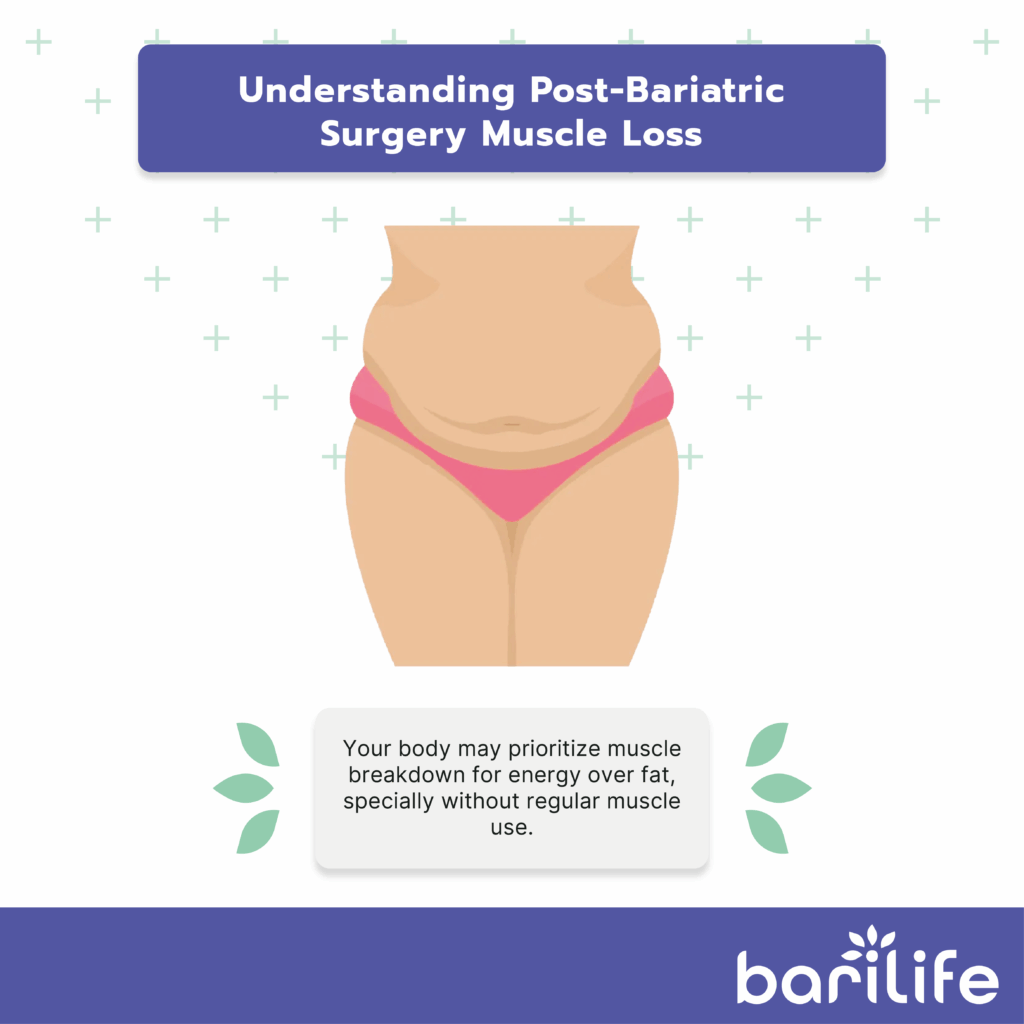
Did you know that you can lose up to 12% or more of your muscle mass after bariatric surgery? That’s equivalent to about two decades of age-related muscle loss that adults over 30 typically experience. It happens because your body needs energy, but has limited food intake after surgery.
Your body often prefers to break down muscle tissue for energy before using fat stores, especially if you’re not exercising those muscles regularly. This process can result in significant muscle loss in the months following your procedure, which might leave you feeling weak and tired.
The good news is that this muscle loss isn’t permanent. You can stop the loss and actually rebuild stronger muscles than before. The key is understanding why this happens and taking proactive steps to prevent it. For some individuals, this might even open the door to eventually exploring powerlifting after bariatric surgery, provided foundational strength and stability are rebuilt first.
That’s why exercise becomes so important after surgery. Regular physical activity signals your body that your muscles are needed and should be preserved. Without this signal, your body might continue breaking down muscle for energy, potentially slowing your metabolism.
Nutritional Strategies for Muscle Growth
Building muscle starts with what you eat. After bariatric surgery, your smaller stomach capacity means you need to be strategic about nutrition.
Protein is your best friend when it comes to muscle growth. Aim for 60-80 grams daily, depending on your doctor’s specific recommendations. Good protein sources include:
- Lean chicken breast
- Cottage cheese
- Greek yogurt
- Salmon and other fish
- Eggs and egg whites
- Turkey
- Lean beef
Many people struggle to meet their protein goals after surgery because of limited stomach space. This is where protein shakes and other concentrated sources can be helpful. Choose options specifically formulated for bariatric needs, as these are typically easier to digest and absorb.
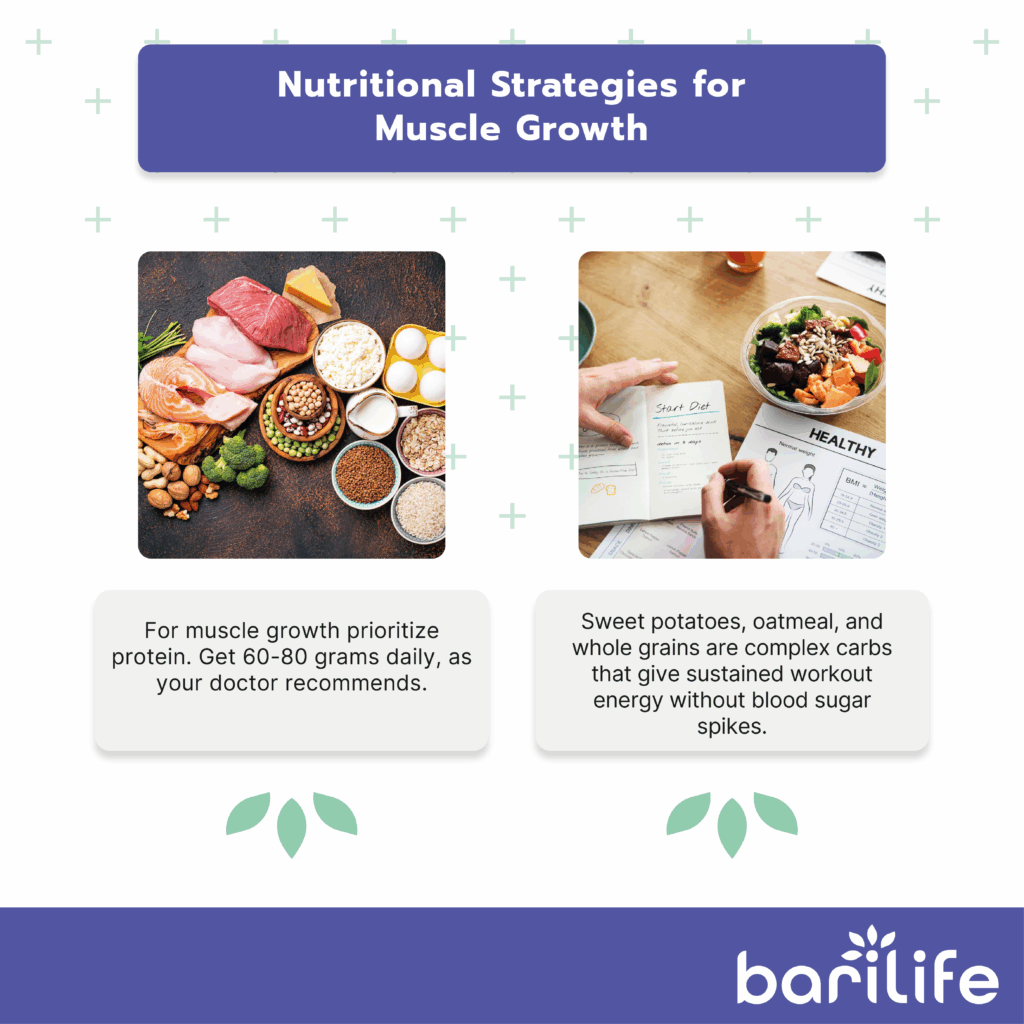
While protein is essential, your body also needs some carbohydrates to fuel workouts and healthy fats to support hormone production (including those hormones that help build muscle). Complex carbohydrates like sweet potatoes, oatmeal, and whole grains provide sustained energy for your workouts without causing rapid blood sugar spikes.
Timing your nutrition can also make a difference. Try to consume protein within two hours after exercise, when your muscles are most receptive to nutrients. This might be a protein shake, Greek yogurt, or another protein-rich snack that works with your post-surgery diet stage.
Small, frequent meals often work better than three large meals, especially when you’re trying to hit your protein goals with limited stomach capacity. Monitor your protein intake to ensure you’re having enough throughout the day. Many smartphone apps can keep track of your nutrition and ensure you’re meeting your protein targets.
Hydration is another crucial element that’s easily overlooked. Water plays a vital role in muscle development and recovery, so try to drink at least 64 ounces of water daily. But make sure to follow your surgeon’s specific guidelines, as they may recommend more based on your particular needs.
Strength Training After Bariatric Surgery
Regular strength training is crucial for gaining muscle after bariatric surgery. It helps preserve your existing muscle mass while encouraging new growth.
How To Start
Start slowly. Many medical providers recommend waiting 4-6 weeks after surgery before beginning any resistance training. When you get the green light, start with:
- Modified bodyweight exercises
- Chair-assisted movements for stability
- Very light dumbbells (1-3 pounds)
- Light resistance bands
First, focus on proper form rather than weight or intensity. You can gradually increase the resistance as you get stronger and more confident. A good rule of thumb is to increase weight only when you can complete 12-15 repetitions with good form and without excessive fatigue.
And if you’re looking to rebuild your body and create a toned, functional physique, toning exercises after bariatric surgery, such as resistance band workouts, light dumbbells, and bodyweight movements, are a perfect start.
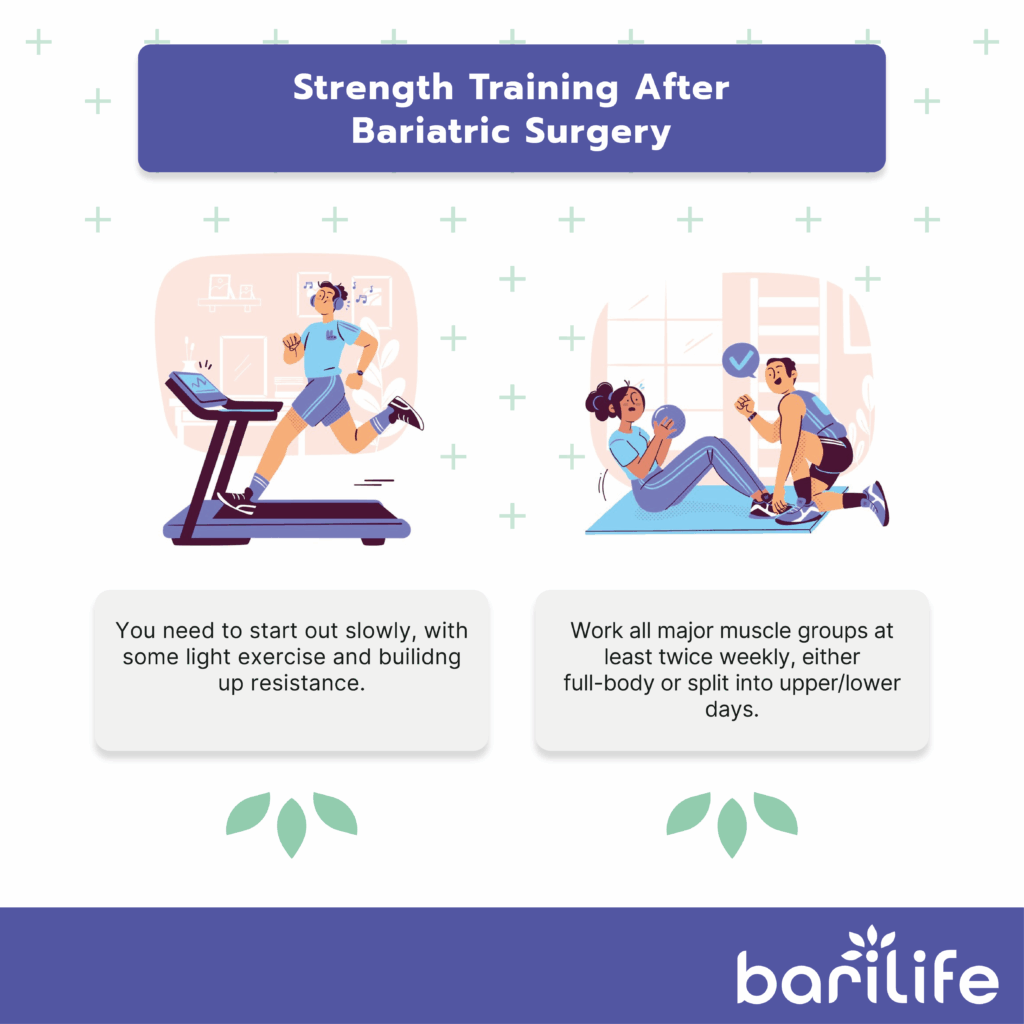
Muscle Groups To Focus On
Include exercises that engage all your major muscle groups:
- Back (rows, lat pulldowns)
- Arms (bicep curls, tricep extensions)
- Shoulders (overhead presses, lateral raises)
- Core (planks, bridges, modified crunches)
- Legs (squats, lunges, leg extensions)
- Chest (modified push-ups, chest presses)
Creating a balanced routine is important. Try to work on all major muscle groups at least two times a week. This might mean full-body workouts several times weekly or splitting your routine into upper and lower body days.
Aim to strength train 2-3 times per week with rest days in between to allow your muscles to recover and grow. Remember that muscle growth happens during recovery, not during the actual workout. Overtraining can actually disrupt your progress and increase the risk of injuries.
Cardiovascular Training
Don’t forget about cardiovascular exercise, too. While strength training builds muscle, cardio improves your heart health and endurance. A combination of both creates the best overall fitness profile. Start with walking and gradually add more intense activities as your fitness improves.
Supplementation for Muscle Recovery & Growth
While real food should be your main source of nutrition, supplements can help fill gaps that might occur after bariatric surgery.
However, before starting any supplement, always check with your healthcare provider. Some supplements may not be absorbed as well after certain types of bariatric procedures, and dosages might need to be adjusted based on your specific situation.
Creatinine
Creatine is a naturally occurring compound that facilitates energy production during high-intensity workouts. Research shows it may help enhance muscle recovery and growth. Start with a low dose (about 3-5 grams daily) and gradually increase after consulting your healthcare provider. When creatine is mixed with water or a protein shake, it’s usually well-tolerated, even with a smaller stomach.
Protein Supplements
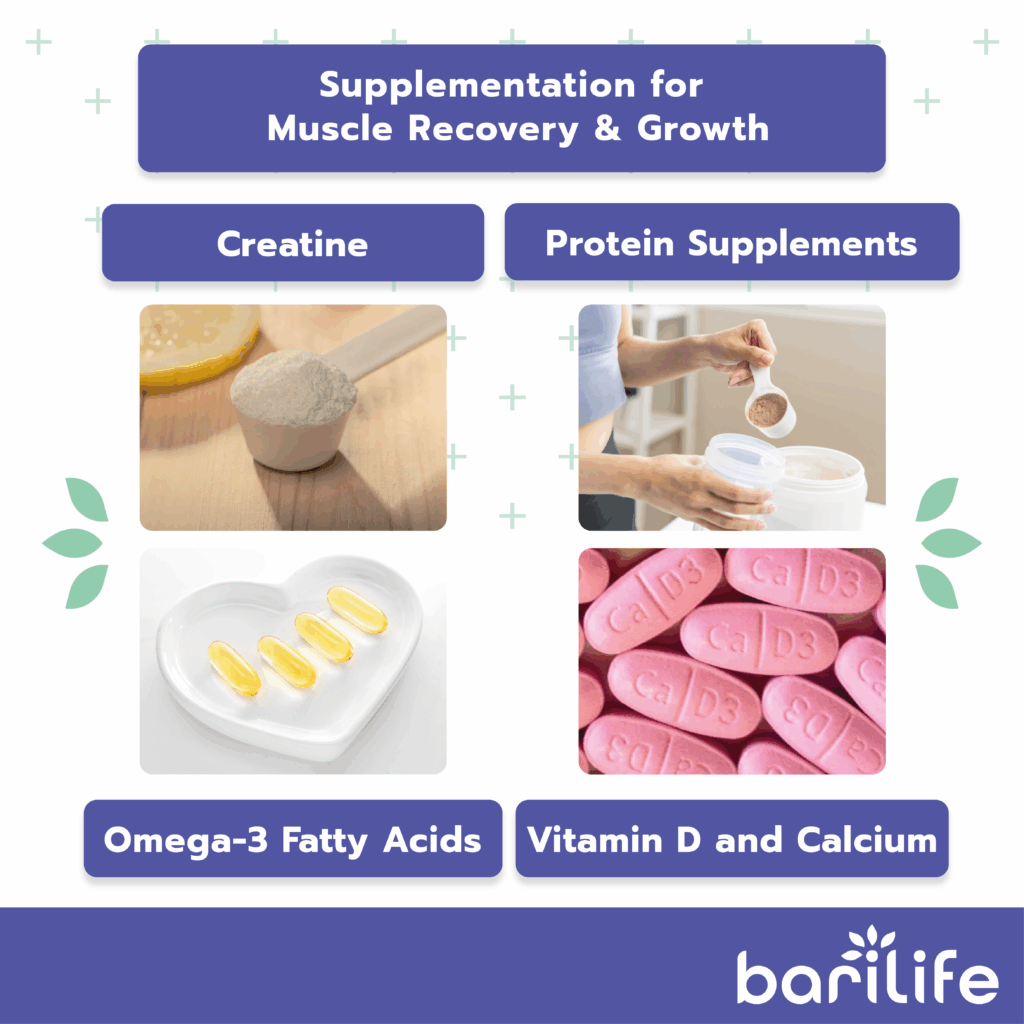
Protein supplements can be beneficial when you’re having difficulty meeting your protein goals through food alone. Whey protein isolate is often well-tolerated after surgery and can support both muscle maintenance and continued weight loss. Look for options specifically designed for people who’ve had bariatric surgery, as these typically contain fewer additives and sugars.
Omega-3 Fatty Acids
Omega-3 fatty acid supplements may help reduce exercise-related inflammation and support overall muscle health. This can be particularly useful during high-intensity training periods. The standard recommendation is about 1-2 grams daily, but your healthcare provider might suggest a different amount based on your specific needs.
Vitamin D and Calcium
You might also benefit from vitamin D and calcium supplements, which are needed for bone health and muscle function. Many people have a vitamin D deficiency, especially after weight loss surgery, which can impact muscle strength and recovery.
Lifestyle Considerations & Long-Term Muscle Maintenance
Building muscle isn’t just about the gym routine or what you eat—it’s a lifestyle commitment that requires consistency and patience.
Develop a Routine
Create a consistent exercise regimen that includes both strength training and cardiovascular exercise. Set a goal to do at least 150 minutes of moderate activity each week, with strength training 2-3 times weekly. Find activities you enjoy; you’re more likely to stick with them long-term. It might be dancing, swimming, cycling, or any other activity that gets your body moving.
Make Time To Rest
Rest also plays a crucial role in muscle recovery and growth. Most of your body’s repair processes happen during deep sleep, so try to aim for 7-9 hours of quality sleep every night. Create a relaxing routine before bed and try to go to sleep and wake up at consistent times to optimize your sleep quality.
Manage Stress
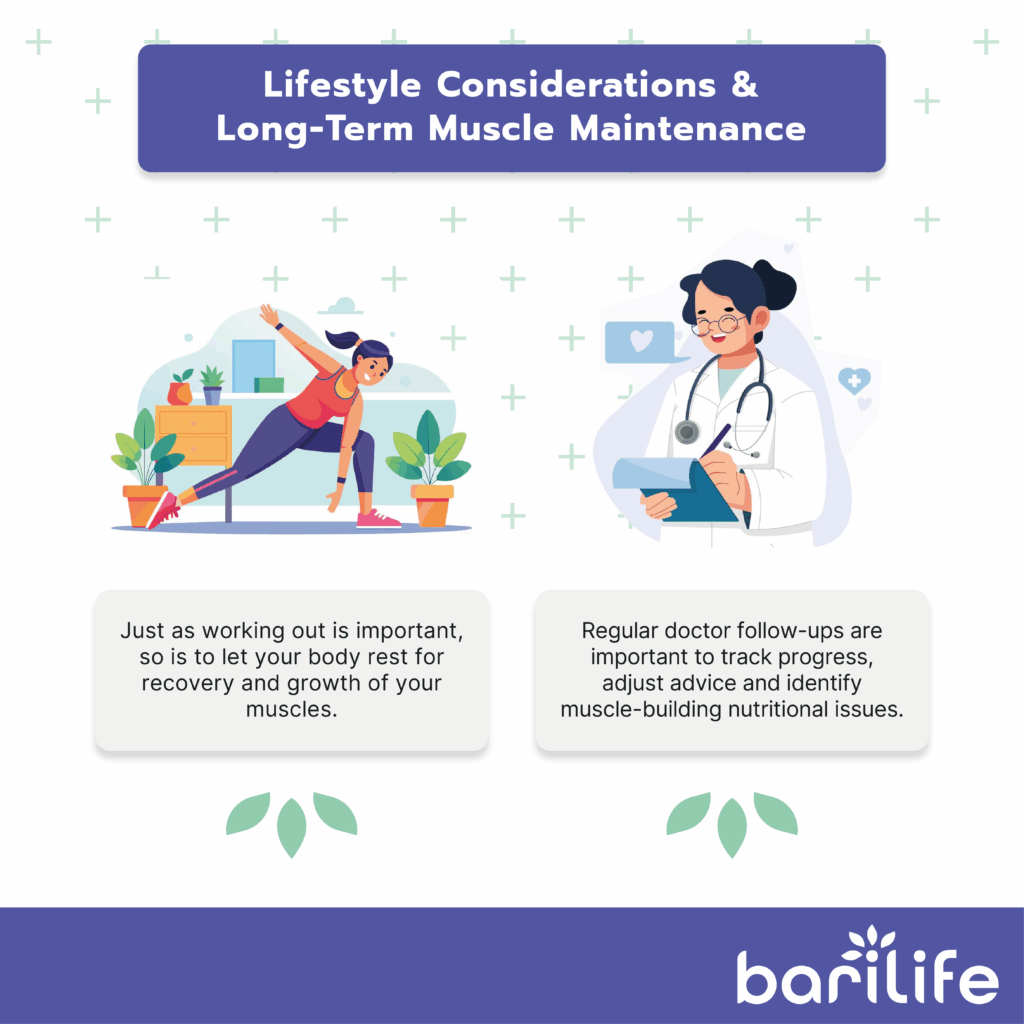
Stress management is another critical factor. High stress levels can raise cortisol, a hormone that can break down muscle tissue. Practice stress-reduction techniques like meditation, deep breathing, or gentle yoga to keep stress hormones in check.
Attend Regular Check-Ups
Make sure to set regular follow-up appointments with your doctor. They can monitor your progress, adjust recommendations based on your needs, and help identify and address any nutritional deficiencies that might be hindering your muscle-building efforts.
Conclusion
Gaining muscle after bariatric surgery doesn’t have to be complicated. Focus on consistent strength training, adequate protein intake, proper supplementation, and healthy lifestyle habits. Your body has the fantastic ability to adapt and rebuild, even after significant weight loss surgery.
With patience and perseverance, you can get a stronger, leaner physique that helps maintain your weight loss and improves your quality of life for years to come.
The journey might have challenges, but remember that thousands of others have successfully built muscle after bariatric surgery. Stay connected with support groups, work closely with your healthcare team, and trust the process. Your effort will pay off with improved strength, better mobility, and increased confidence in your new body.
How Bari Life Can Help
Building muscle after bariatric surgery requires proper nutrition, and that’s where Bari Life comes in. Our specially formulated supplements are designed to meet the unique nutritional needs of people who have undergone weight loss surgery.
Our bariatric protein shakes provide high-quality protein in forms that are easy to digest and absorb, supporting your muscle-building goals. Whether you prefer bariatric protein bars or need an easily mixable option, our lineup ensures you’re fueling your body effectively.
Meanwhile, our bariatric multivitamins and bariatric multivitamin with iron ensure you get all the essential nutrients needed for optimal recovery and health. We also offer bariatric vitamins chewable and liquid bariatric vitamin options for those who have difficulty swallowing pills, making it easier to stay consistent with your daily regimen.
We understand that hair thinning can be a concern post-surgery, which is why we offer targeted bariatric vitamins for hair loss to help you maintain healthy hair while you heal and grow stronger.
To round out your routine, our bariatric calcium chews support bone health, while our bariatric probiotic helps maintain digestive balance—especially important after surgery when gut flora may be altered. And when you’re looking for a quick bite that fits your plan, our delicious bariatric snacks make it easier to stay on track without sacrificing taste.
Many of our customers have found that convenient, bariatric vitamins and nutrition-specific supplements make it much easier for them to stick to their plan. This is essential for successful muscle building after surgery.
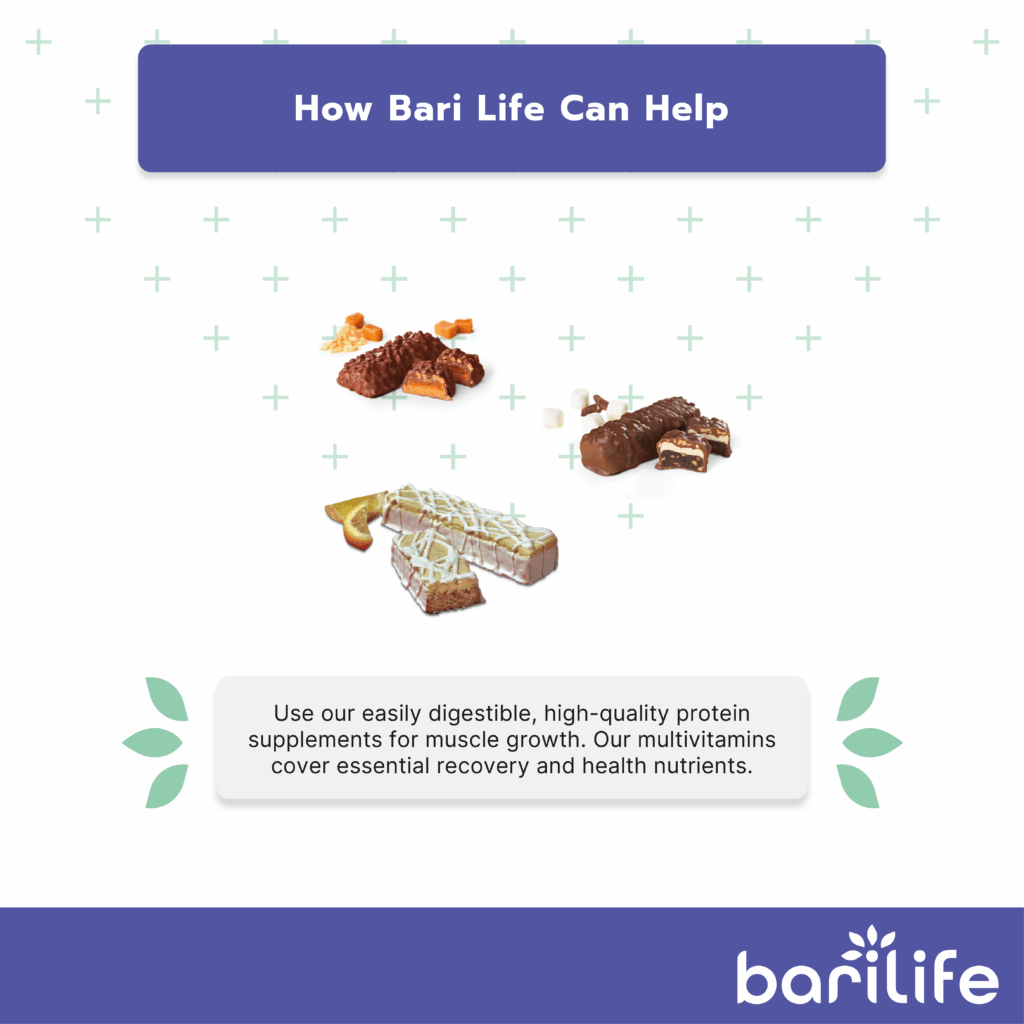
Don’t let nutritional gaps slow down your muscle-building journey. Visit Bari Life today to discover how our specialized supplements can support your post-surgery success and help you build the strong, healthy body you deserve.
If you want to learn more, why not check out these articles below:
- Transfer Addiction After Bariatric Surgery
- Smoking After Bariatric Surgery
- Sex After Bariatric Surgery
- How To Sleep After Bariatric Surgery?
Resources
Sawaya, R. A., et al. (2012). Vitamin, Mineral, and Drug Absorption Following Bariatric Surgery. Current Drug Metabolism.
de Salles, B.F., et al. (2009). Rest interval between sets in strength training. Sports Med.



What are your tips and tricks to post-bariatric success?